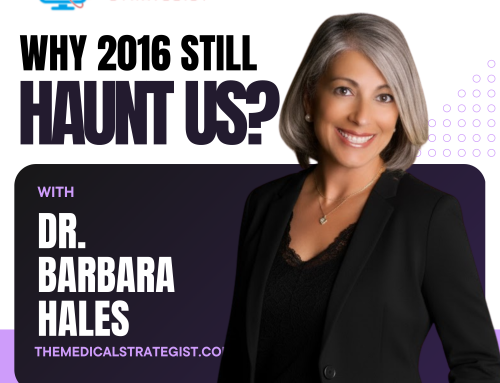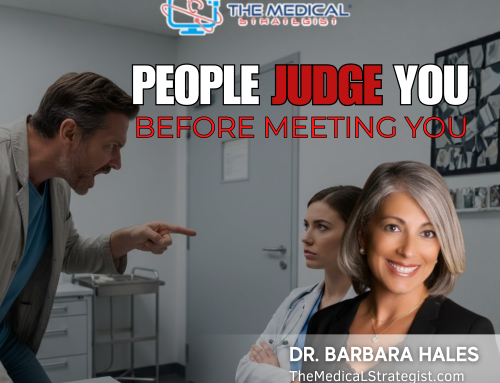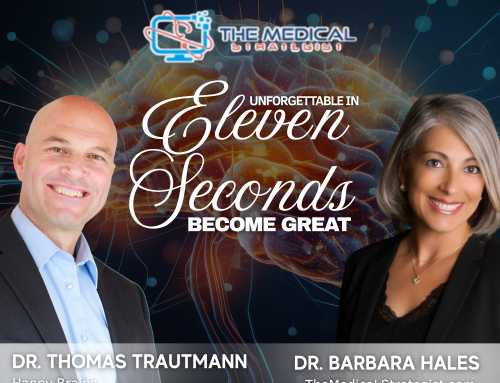Podcast: Play in new window | Download
Subscribe: RSS
In this powerful episode of Marketing Tips for Doctors, host Dr. Barbara Hales explores how AI is transforming the healthcare landscape in practical, life-changing ways. From improving patient education and optimizing hospital operations to empowering small clinics with cost-effective tools, Barbara breaks down what AI can do for your practice today.
You’ll hear two heartwarming stories and two real-world case studies—including Cleveland Clinic’s 30% organic traffic boost and Mayo Clinic’s dramatic scheduling improvement—plus actionable strategies for integrating AI responsibly. If you’ve ever wondered how to harness AI without losing the human touch, this episode is your guide
Key Takeaways.
Use AI to improve—not replace—human connection: Focus on tools that make content more patient-centered and processes more efficient.
Connect with Jeff Greenfields:
Website: https://provalytics.com/
LinkedIn: https://www.linkedin.com/company/provalytics/
Instagram: https://www.instagram.com/provalytics/
YouTube: https://www.youtube.com/@provalytics
Twitter: https://x.com/provalytics
Facebook: https://www.facebook.com/provalytics
Connect with Barbara Hales:
Twitter: @DrBarbaraHales
Facebook: facebook.com/theMedicalStrategist
Business website: www.TheMedicalStrategist.com
Email: info@TheMedicalStrategist.com
YouTube: TheMedicalStrategist
LinkedIn: www.linkedin.com/in/barbarahales
Books:
Content Copy Made Easy
14 Tactics to Triple Sales
Power to the Patient: The Medical Strategist
Transcription (210)
Timestamps & Detailed Talking Points
[00:02] Why AI in healthcare isn’t about replacing people—but partnering with them:
Barbara opens by addressing the big fear: Will AI take over healthcare jobs? She reassures listeners that AI’s true role is as a supportive partner, not a replacement. Instead of removing the human touch, AI can actually make care more human by eliminating inefficiencies, freeing up time, and enabling better communication. This sets the tone for an episode focused on empowerment rather than fear.
[01:01] Three major ways AI is changing healthcare:
Now, I know AI can sound intimidating. Some people imagine robots taking over or computers replacing doctors and staff, but that’s not the reality. What’s really happening is much more exciting. AI is becoming a partner—helping us to be more efficient, more creative, and even more compassionate in the way we serve patients.
In this episode, we’ll look at three areas:
- How AI is transforming content creation
- How AI is reshaping teamwork and collaboration
- How AI is empowering decision-making
Along the way, I’ll share two heartwarming stories and two real-world case studies that bring this transformation to life. So, let’s jump in.
[01:31] How AI is transforming content creation:
In the past, content creation in healthcare was slow, manual, and often didn’t match what patients were actually searching for. A writer would draft an article, a doctor would approve it, a marketer would polish it—and by the time it went live, the topic might already be outdated.
With AI, that’s changing. AI can generate first drafts in seconds, suggest SEO-friendly keywords patients are already typing into Google, personalize messages for different patient segments, and even translate into multiple languages instantly. Think about that for a second—AI isn’t just making content faster, it’s making it smarter and more human-centered.
[02:40] Cleveland Clinic case study: Improving patient trust through AI-driven content:
One great example is the Cleveland Clinic. They realized patients were Googling symptoms and health information long before setting foot in the hospital. However, their educational materials weren’t appearing in searches because they didn’t align with how people actually asked questions.
So they turned to AI-driven content optimization. The system analyzed what patients were searching for—phrases like “Why am I so tired?” or “How to tell if chest pain is serious?” Then their writers used those insights to create content that answered those exact questions.
Within a year, the Cleveland Clinic saw a 30% increase in organic traffic to its health library pages. But more importantly, patients began to say:
“I trust Cleveland Clinic because when I search online, they give me answers I can actually understand.”
This is where AI shines—it’s not about replacing medical expertise. It’s about making that expertise accessible and discoverable to the people who need it most.
[04:12] Heartwarming story: A grandmother, her diabetic grandson, and AI-powered education:
Here’s a story that shows just how personal AI-driven content can be. A small clinic in rural Tennessee didn’t have big budgets or large staff—just three providers and a few nurses serving their community.
One of their patients, Maria, was a grandmother raising her 10-year-old grandson. He had recently been diagnosed with type 2 diabetes. Maria cared deeply for him, but she admitted to the doctor:
“I don’t understand these instructions. I’m scared I’ll mess this up.”
The clinic had just adopted an AI-powered patient education tool. Instead of handing her a dense pamphlet full of medical jargon, they used AI to instantly create a clear, easy-to-read plan in both English and Spanish. It included pictures of simple meals—foods her family actually cooked at home.
Two months later, Maria returned with her grandson, smiling. She said:
“I finally understand what he can and cannot eat. We’re cooking differently now, and he’s feeling better. His sugars are coming down.”
AI didn’t feel like technology to her—it felt like someone finally listened. It turned medical instructions into something she could act on with love.
[06:04] How AI is reshaping teamwork and breaking silos:
Traditionally, healthcare teams were siloed—marketing in one corner, clinicians in another, operations in yet another. Coordination was slow and often frustrating. AI is changing that.
With shared dashboards, predictive analytics, and automated workflows, AI gives everyone access to the same insights. Marketers and analysts can collaborate on patient engagement campaigns. Physicians and educators can co-create patient materials with AI support. Managers can see staffing needs in real time and adjust accordingly.
Instead of teams fighting over resources or duplicating work, AI provides a neutral data source that everyone can trust.
[07:14] Mayo Clinic case study: How AI revolutionized scheduling and reduced stress:
Take Mayo Clinic as an example. Their scheduling system used to be a nightmare—overbooking cardiology, under-booking dermatology, and patients waited weeks for appointments.
They introduced an AI-powered operations platform that unified their teams. The AI predicted patient flow, flagged bottlenecks, and suggested staff adjustments. The results were dramatic:
- 22% improvement in scheduling
- Patients were seen sooner
- Staff stress dropped significantly
Perhaps most importantly, AI gave teams a shared language of truth. Instead of debating who was right, they could look at the data together and make decisions faster. That’s a cultural shift AI made possible.
[08:40] The acne story: How a small practice used AI to change a teenager’s life:
Now let’s talk about a small dermatology practice in Florida. They didn’t have a budget for a big marketing team, so they turned to an AI social media assistant. One of the first posts it suggested was a friendly carousel: “5 Myths About Teen Acne.”
A few weeks later, a mother brought her 15-year-old daughter to the clinic. She quietly told the receptionist:
“We came because of that acne post. My daughter has been so embarrassed about her skin that she wouldn’t even look in the mirror. But when she read your post that said acne isn’t her fault, she finally felt brave enough to come in.”
The dermatologist treated her, and within months, her skin improved dramatically. At her follow-up visit, the girl smiled and said:
“I’m not scared to go to the school dance anymore.”
Think about that—a simple AI-generated post changed not just her skin, but her confidence, her social life, and her self-esteem.
[10:00] AI-powered decision-making: Turning guesswork into clarity:
In the past, decisions were often based on gut instinct or outdated reports. AI is rewriting the playbook. Leaders can now:
- Forecast patient flow and staffing needs with predictive analytics
- Run “what-if” scenarios for marketing campaigns or operational changes
- Analyze patient sentiment in real time through surveys and online feedback
This doesn’t mean leaders stop using their judgment. It means they can combine experience with AI-powered foresight. Decisions become clearer, faster, and less risky. And when teams trust the data, it reduces conflict and builds alignment.
[11:20] The limitations: Why AI still needs human oversight:
Of course, AI isn’t a magic wand. There are challenges:
- Bias in AI models can unintentionally exclude certain groups
- Teams need training to use AI responsibly and effectively
- Transparency is critical—decisions can’t just be because “the algorithm said so”
That’s why AI must always be paired with human oversight and compassion.
Recap: Making Healthcare More Human
AI is transforming content—making it faster, smarter, and more personal. It’s reshaping teams—breaking down silos and creating collaboration built on data. And it’s enhancing decision-making—turning guesswork into clarity.
As we’ve heard in these stories and case studies, AI isn’t about replacing people—it’s about empowering them. It’s about a grandmother who finally understood how to care for her grandson, a teenager who gained confidence, a hospital that reached more patients, a clinic that scheduled care more efficiently.
When done right, AI makes healthcare more human, not less.
Closing Thoughts
So, I want to leave you with this question:
How could AI help you deliver better care, clearer communication, or stronger teamwork in your practice?
I’d love to hear your thoughts and stories. Reach out to me—I may feature your experience in a future episode. Put it in the comments, and remember this:
AI is not the future replacing us. AI is the future partnering with us, helping us serve smarter, faster, and with more compassion.
Thank you for tuning in to Marketing Tips for Doctors. Until next time—stay visible, stay connected, and keep putting the human touch at the center of everything you do.



